Call for solidarity with the people of Ukraine to ensure justice and peace, now.
Desmond Tutu said: “To choose hope is to step firmly forward into the howling wind, baring one’s chest to the elements, knowing that, in time, the storm will pass. Despair turns us inward. Hope sends us into the arms of others.”
The war in Ukraine has affected every nation in the world on a geo-political and economic level. We hear of the gross human rights violations and atrocities and watch millions of people streaming out of their country, taking only what can fit in a backpack, boarding trains, planes and cars. Bewildered children. Bombs targetting churches, train stations and homes.
Although the conflict may seem distant from South Africa, we are directly affected due to the skyrocketing cost of petrol with its knock-on effect on food prices and inflation. But beyond the geopolitical debate, there is a deeper shared experience between what is happening in Ukraine and Africa’s history of struggle against colonialism and oppression.
In partnership with the Ukrainian Association of South Africa, the Desmond & Leah Tutu Legacy Foundation hosted a dialogue with women’s and children’s rights advocate Graça Machel and other African and Ukrainian civil society leaders, on the impact of the war on the people of Ukraine, and the urgent need for accountability and peace.
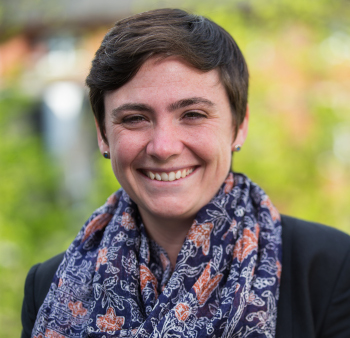 Janet Jobson, CEO of the Desmond & Leah Tutu Legacy Foundation
Janet Jobson, CEO of the Desmond & Leah Tutu Legacy Foundation The webinar was facilitated by Janet Jobson, CEO of the Desmond & Leah Tutu Legacy Foundation. Jobson emphasised that the focus of the dialogue was on our shared common humanity rather than the geo-political debate between Russia and Ukraine.
By creating a virtual platform for a series of dialogues where interested parties can come together to exchange African and Ukrainian shared experiences, the Foundation hopes to lead the way to find ways to encourage global solidarity against human tragedy.
Jobson said that in the struggle to overcome our colonial past, Africans know the importance of being vocal in the fight for justice and peace globally. Africans cannot be neutral in the face of human rights violations in Ukraine. Our contexts may be different, but in sharing our stories we learn that our humanity is bound up in each other.
During discussions and setting up the panel of four speakers, it became apparent that for the people of Ukraine the war that has been raging for nearly six months is experienced as a new wave of colonialism by imperialist Russia.
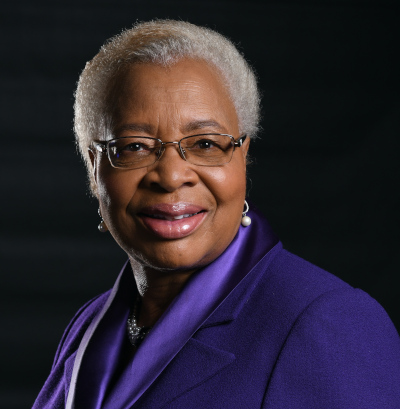 Graça Machel, women’s and children’s rights advocate, beloved mother and grandmother.
Graça Machel, women’s and children’s rights advocate, beloved mother and grandmother. Jobson asked Machel to kick off the discussion by explaining why the conflict in Ukraine should matter to the people in Africa. The esteemed women’s and children’s rights advocate emphasised that she was participating in the panel as an individual, and not as a representative of The Elders.
As a mother and grandmother watching women amid explosions trying to guide and protect their children who do not understand what is going on is heartbreaking, said Machel. The pain and despair felt in Ukraine is a shared experience with many Africans as wars continue to devastate many nations, such as in Mozambique, Burkina Faso and Mali.
Machel described her amazement at the intensity and speed of millions of families of people crossing borders, desperately fleeing their country. “We never thought this would happen again. But it is happening. It is a human tragedy. I have seen this before on my continent but never in such a concentration of time. It was like the camera shifted from Africa to another place but it’s exactly the same trauma. There is no distinction at all. We feel the pain,” Machel said.
“War doesn’t care where you are. War is blindly cruel,” she said. “It matters to Africans because it is a human tragedy. Human pain and human tragedy are exactly the same for all of us.”
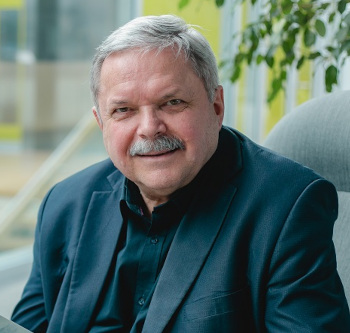 Myroslav Marynovych, founding member of the Ukrainian Helsinki Group.
Myroslav Marynovych, founding member of the Ukrainian Helsinki Group.Ukrainian social activist Myroslav Marynovych, founding member of the Ukrainian Helsinki Group (1976) on Human Rights, was asked to explain the historical context of the conflict.
Marynovych spoke about the importance of human rights globally and his personal experience of 10 years’ imprisonment as a human rights activist by the Soviet totalitarian government. He emphasised that the propaganda machine in Russia sees freedom of speech and other individual human rights, that are part of any democracy, as a threat to Vladimir Putin’s attempt to re-colonise the smaller country.
“We are facing merciless violence by something which is essentially evil,” Marynovych said. “Evil doesn’t stop by itself. It has to be stopped.”
The lived experience of the atrocities of war was shared by Victor Ochen, founder and executive director of the African Youth Initiative Network in Uganda. Born in northern Uganda, Ochen spent 21 years in refugee camps. He grew up amid violent conflict that displaced over three million people, where more than 60,000 children were abducted and forcefully recruited as child soldiers.
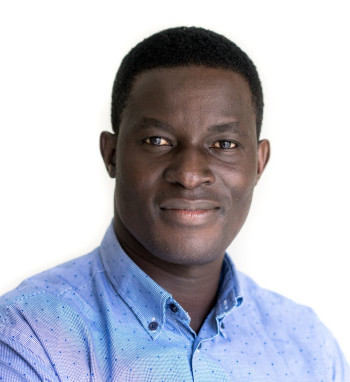 Victor Ochen, founder and executive director of the African Youth Initiative Network in Uganda.
Victor Ochen, founder and executive director of the African Youth Initiative Network in Uganda. Having worked with survivors and young children trying to overcome the fear that something could happen to their parents, or watching their mother or sister being killed, raped and tortured, Ochen said it is hard to imagine that we can transform our trauma into something positive. For Ochen this came in the form of a leadership role in helping others in similar circumstances.
“We know what it means to be victims of war. We are not here to choose sides,” said Ochen. “We stand for the victims and for what is good. Our shared humanity.”
Quoting Archbishop Desmond Tutu, Ochen said Africans must prepare to lead the world towards peace and harmony as the only nuclear weapons-free continent. Hundreds of years of colonial rule and war have tempered African resilience where war criminals became presidents and sexual violence and child conscription are used as weapons.
Ochen and his team were invited to Ukraine by mental health experts to share their experience of living through war and helping others. “Full-scale war is not known in Europe as it is in Africa. They do not have the same history of experience, so they came to us seeking our knowledge and help,” said Ochen.
Human rights defender, lawyer and civil society activist based in Kyiv, Oleksandra Matviichuk said the Centre for Civil Liberties and other civil societies jointly documented more than 13,000 criminal episodes targetting civilians. “This is just the tip of the iceberg,” she said.
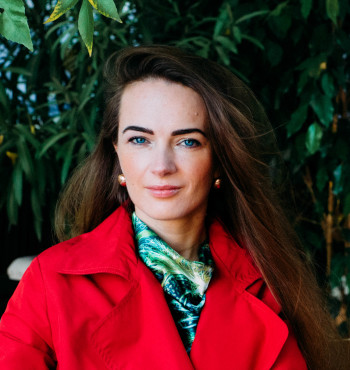 Oleksandra Matviichuk, human rights defender, lawyer and civil society activist based in Kyiv.
Oleksandra Matviichuk, human rights defender, lawyer and civil society activist based in Kyiv. “Russia is using war crimes as a method of war. There is no legitimate purpose to force people to go down into the basement, to order them to appoint eight volunteers and no purpose in shooting them. There is no purpose in using tanks for fun shooting at innocent people on bicycles whose bodies lay scattered around the streets until the liberation of that region,” Matviichuk said.
“Human pain and human solidarity have no limitations in national borders which is why what is happening in Ukraine is so understandable for people in Africa. We live in a very interconnected world and only the spread of the idea of freedom makes anothers’ world safer.”
The conversation turned to what global human solidarity would look like. Machel said solidarity is built slowly through friends and civil societies, and not necessarily among politicians at state level. The Just Peace dialogues are a series, Machel said, and this was just the beginning of the debate and getting people together to find ways of growing human solidarity for the people of Ukraine.
Machel said the conflict also showed the world a different way of treating refugees “with much less of the additional pain we see in other parts of the world. It is possible to treat refugees with dignity”. It showed how networks can be opened to assist vulnerable people.
She emphasised that the war has affected all nations, big and small, wealthy and poor. “It has changed our daily lives and the way we put food on the table. We are all losing.”
There was a discussion in the chat feed from the audience asking how one negotiates with evil and if just peace is possible.
Matviichuk replied that there were many ways for people and civil societies to express solidarity. “Ordinary people have much more power than they realise. A joint contribution to our joint struggle will end the war quicker than a UN intervention.” She added that “Russia has enjoyed impunity for decades and has never been punished for war crimes. I fear that if Putin is not stopped in Ukraine, he will go further”.
Jobson acknowledged that there was a “missing voice in the room” and asked whether there were civil society groups in Russia that could be reached, noting the extreme risk human rights activists face in that country.
Machel said: “All wars end by sitting around the table. All the people of the world don’t need to suffer anymore. Enough is enough. This war must end. I don’t have the answers, but we need to be creative.”
Future discussions could explore how to ensure that any negotiated peace agreement included justice to those who have suffered and that peace is long-lasting and not a temporary pause to the violence.
The webinar ended on a very positive note with the resounding call for peace and justice, and a deep sense that we need to build global human solidarity between Africa and Ukraine.
Monika’s chat: “A very good day together with my full support for a just and swift peace for all in Ukraine” sums up the panellists’ takeaway from the debate.
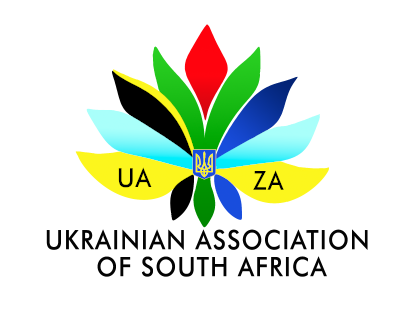 Look out for the next debate in this series …
Look out for the next debate in this series …Watch the full webinar on YouTube: https://www.youtube.com/watch?v=ogFrjDtFLeg